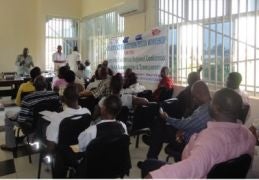 Public Financial Management (PFM) reforms around the world are often designed and monitored by a handful of ‘technical experts’. Not in Sierra Leone. The Sierra Leone Integrated Public Financial Management Project (IPFMRP) is one of the few Bank-funded projects in which a Government has decided to channel $ 1.0 million of its grant funds to civil society to monitor the use of public funds.
Public Financial Management (PFM) reforms around the world are often designed and monitored by a handful of ‘technical experts’. Not in Sierra Leone. The Sierra Leone Integrated Public Financial Management Project (IPFMRP) is one of the few Bank-funded projects in which a Government has decided to channel $ 1.0 million of its grant funds to civil society to monitor the use of public funds.
Here are some emerging lessons from this ongoing experience:
The Bank can be an effective convener between government and civil society: During IPFMRP preparation, the Bank team played a key role in establishing a dialogue between the government and civil society (CSO) groups and in facilitating several important negotiations between the government and CSOs. At the start, the government suggested that civil society monitoring activities be managed by the donors outside the grant, even if it meant fewer resources for government within the grant. The CSOs debated the trade-off between the risk of unfair treatment by government against the option of fairer treatment, but the risk of being marginal players. In the end, both sides came out in favor of the potentially more rewarding but more difficult option. According to Vivek Srivastava, the Task Team Leader, “both parties had very legitimate and real concerns but showed remarkable maturity to arrive at a solution that helped establish a healthy partnership.”
Finding reform champions who have a common vision is key for effective partnership: A number of emerging champions are playing a key role in moving the partnership forward. Augustus Cole, the Director of PFM Reform in the Ministry of Finance, and one of the champions, says that he "believe[s] that open and frank discussion with civil society actors can help [them] make better policies”. Mohamed Sidi Bah, a civil society leader points out: “We realized that we can’t expect everything from governments and donors; we need to be part the debate, define our own priorities, and take advantage of the opportunities”.
Global initiatives have also helped in motivating the two-sides to work together. They now have a common goal: scoring high in the Open Budget Initiative (OBI). Sierra Leone will be included in the 2012 OBI rankings for the first time. The partners are now mobilizing its energy towards the publication of citizen’s budget for the first time in Sierra Leone. A citizen’s budget is one of the eight key documents to be evaluated by the OBI. Both the government and the civil society coalition see this as critical to help citizens better understand budgets, and to boost the country’s public image.
Government-civil society interaction needs to be a continuous process: With project funds, the government and CSOs started to exchange feedback on a systematic basis. In the past few months, the government invited CSOs regularly to budget discussions; and solicited their inputs for key pieces of legislation, including, most recently, the Audit Service bill. Civil society representatives now routinely participate in kick-off and wrap up meetings for Bank project missions. The government even included civil society representatives in a recruitment panel for a position under the project.
The government has also financed multiple trips for CSOs to attend international budget transparency and accountability trainings. The representatives returned home from these workshops with concrete recommendations on how to improve PFM processes in Sierra Leone. They also systematically share with other CSOs what they had learned abroad through a series of regional events that got wide media coverage.
ICTs can play an important role in linking national and local CSOs: A key challenge is to extend this engagement beyond a few CSOs based in the capital city. To address this challenge, the civil society coalition appointed regional focal points and set up a group text-messaging system as the main mode of communication. They also set up a Facebook page to post messages, documents and exchange ideas through. Over the past few months, the use of ICT has helped enormously to expand the CSO network working on PFM reform.
Moving Forward: Can the Bank play a role?
Vijay Pillai, the World Bank’s country manager in Sierra Leone, feels that that “a useful role for the Bank in the near future is to continue to advocate for adequate space for an increasingly honest dialogue between the government, the parliament and civil society. If that space continues to exist, we should expect the budget dialogue to get more robust with time.”
That remains to be seen. What is already clear, however, is that the Bank has a key role to play in providing the right incentives to the government and civil society counterparts.
Photo: NSA Reflection Workshop in Makene, Sierra Leone- 6.28.2011


Join the Conversation